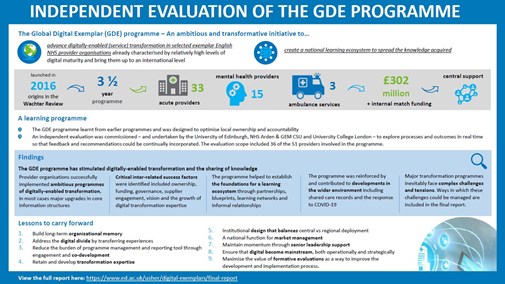An independent evaluation of the Global Digital Exemplar (GDE) programme, undertaken by the University of Edinburgh, NHS Arden & GEM Commissioning Support Unit and University College London, has published its findings.
The independent evaluation report praises the programme for stimulating digitally-enabled transformation and helping organisations to achieve international standards of excellence.
Originally launched in 2016, the Global Digital Exemplar programme has supported 51 NHS acute, mental health and ambulance trusts to digitally transform - with local organisations required to match fund national investment of £302 million.
Those trusts were already doing digital, but through the programme were given the opportunity to demonstrate that the NHS could do digital well and push the boundaries of their own journeys.
Advances made in hospitals on the GDE programme include patients being treated for sepsis faster, frontline staff spending less time on admin tasks, and electronic systems being implemented more swiftly and effectively.
The evaluation found that the GDE programme has accelerated digitally-enabled transformation with a number of interrelated features proving critical to the success of sites, including:
- High level ownership at board and divisional levels and clinical ownership across the organisation
- Growth of digital transformation expertise (exemplified by the appointment of Chief Information Officers, Chief Clinical Information Officers and Chief Nursing Information Officers)
- Having an internal vision and strategy for digitally enabled transformation and targets linked to accreditation
- Dedicated multi-year funding, matched internally, linked to the fulfilment of plans
- Strengthened engagement between adopters and vendors.
Professor Robin Williams, Director of the Institute for the Study of Science, Technology and Innovation at The University of Edinburgh, said: “It is great to see that the GDE programme has succeeded in promoting digital transformation. The combination of resources, governance, and reputation, supported by increasing status of clinical change expertise has helped to achieve this.
“As a first-of-type in the world, this was such an exciting initiative to work on. We are proud to have contributed to the success of this programme through our formative feedback and hope that we will be able to continue to facilitate the digitisation agenda of the NHS and internationally.
Sally Eason, Associate Director of Digital Transformation at Arden & GEM, said:“Having been involved in this programme from its inception – initially providing a baseline evaluation for the first acute sites, then establishing a learning network through to working alongside the University of Edinburgh on the full evaluation – I’m delighted to see the impact that it has had on digital maturity.
“The GDE programme has helped establish a culture of learning and sharing between sites, and within the wider health system, which will benefit other digital programmes of work and strengthen professional networks.”
Knowledge transfer through formal and informal learning networks, and the creation of resources such as Blueprints, has established a lasting legacy of collaboration between organisations.
A number of GDEs have now formally received their accreditation for meeting the aims of the programme, with many more expected to do so in the coming months.
A one page summary of the evaluation report is available below:
View the full report on the University of Edinburgh’s website.
“I would like to thank the Global Digital Exemplar and Fast Follower trusts for supporting and creating a learning and sharing environment, and the confidence that the NHS can deliver ‘What Good Looks Like’ in terms of digital transformation. I look forward to seeing further programme participants reach their accreditation status and continue to share invaluable learning with our cohort of Digital Aspirants.”
Sonia Patel, Chief Information Officer at NHSX

